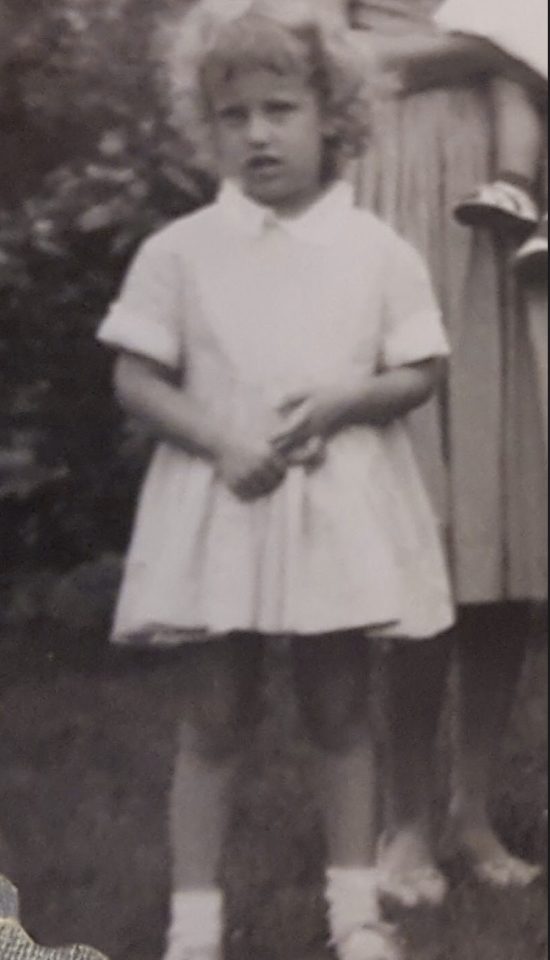Then Moses said to the LORD, “O my Lord, I am not eloquent,
neither before nor since You have spoken to Your servant;
But I am slow of speech and slow of tongue.”
So the LORD said to him, “Who has made man’s mouth?
Or who makes the mute, the deaf, the seeing, or the blind? Have not I, the LORD?
Now therefore, go, and I will be with your mouth and teach you what you shall say.”
Exodus 4:10 – 12 (NKJV)
Tears sat on my cheeks. Fear shone in my eyes. And yet, the lesson continued.
“Mr. Meredith, I would like you to meet my daughter, Melissa.” Then, leaning over and putting out his hand, he pretended to be Mr. Meredith. “Nice to meet you, Melissa. How are you?”
A tiny hand and a wisp of a voice came from behind the curls that fell over my downturned face, “Fine, thank you. How are you?”
“That’s better,” he commended. Coming down on bended knee and lifting my chin with a finger, he gently encouraged, “This time, look into my eyes and do what I told you to do.”
Church was over, and the building echoed emptiness. My brothers had taken our little sister home to the parsonage next door. Now, only three people remained in the linoleum floored foyer: my father, my mother and six-year-old me.
That night—once again—I had hidden behind my mother and cried when introduced to someone.
Everyone knew that this was not the way preachers’ kids were supposed to act. Quite frankly, I wasn’t sure why I had to talk to anyone.
I was quite happy observing life from where I was.
Behind my mother.
But that was not an option in the Phillips’ family. So, there I stood wearily practicing how to shake a hand and look someone in the eye while saying, “Fine, thank you. How are you?”
I sensed my mother’s compassion. She, too, knew what it was to be painfully shy.
“Fine, thank you. How are you?” Over and over, I met one imaginary person after another, until I could do it by rote.
The lesson finally ended, but the push to get me out of my comfort zone did not.
“Middle school me” crying while I played piano for visiting guests, “high school me” competing while waves of nausea washed over me and my legs shook too hard to control the piano’s sustaining pedal, “adult me” speaking in public while crimson hives crept up my neck—these, as well as awful, embarrassing last-minute bathroom trips come to mind.
My father simply refused to let me use my fear as an excuse to hide from life.

This would shock most of my former students because I have learned, for the most part, to act like I am “fine, thank you.”
So, why do I write this right here and right now?
Because, though I love to put words on paper, I don’t love putting myself in a vulnerable position. It would be much easier just to keep writing in my journal—to stay in the shadows.
Moses felt the same way. He was all for freeing God’s people from the tyranny of Egypt. Hadn’t he intervened once to save the life of one of his countrymen? But once was enough, thank you. That venture sent him running for his life to the backside of the desert.
Now, his hiding place had become his home.
But God saw things differently. The desert was just a training ground. The time had come for action and Moses was His guy.
Only Moses didn’t agree. He was not ready, and he was sure that he was not the guy. So, he offered a better plan – a better man. One who did not stutter and stammer. In the end, though not utterly convinced, he listened.
Who has made man’s mouth? Or who makes the mute,
the deaf, the seeing, or the blind? Have not I, the LORD?
Exodus 4:11 – 12 (NKJV)
I would never think to line myself up with the likes of Moses. Not for one moment. But I do relate with his hesitation.
He was getting up there. He had been burned. Now, he was comfortable where he was. Besides, shepherding was his thing, certainly not this—leading three million stubborn Israelites.
But God didn’t agree. God’s plan was to rescue His people.
Ultimately, God’s plan was to bring God glory.
“Behold, I make a covenant. Before all your people I will do marvels such as have not been done in all the earth, nor in any nation; and all the people among whom you are shall see the work of the LORD.” Exodus 34:10 (NKJV)
So, He insisted that Moses get uncomfortable. Sometimes that’s what good fathers do.
Some would consider my dad’s “motivating” to be child abuse, and he would be told to accept his daughter as she was. I can totally picture his expression at that statement—sitting at our round kitchen table, looking over the top of his glasses, eyebrows raised as he pauses from reading the newspaper in front of him. He was a child of the Great Depression and World War II. No, he definitely didn’t consider it abuse.
And it wasn’t.
Was it often uncomfortable? Absolutely. But I knew that behind every challenge, discipline, and forced participation was a heart of love.
I’m not sure when it was, but one time I asked my mother why daddy was so adamant about making all of us get out of our shells. She said it was because when God called him to preach, daddy couldn’t think about getting up in front of people without getting sick.
So, he ran.
For ten years.
When he finally surrendered to God’s call, peace washed over him and the assurance that, with God’s help, he could step over the fear. And he did.
My mother explained that he just wanted us to be able to do anything God wanted us to do, the first time God asked us to do it.
Because fear wants to stop us.
Maybe fear wants to stop you, too.
Come, stand beside Moses and me.
Listen as our heavenly Father leans in and whispers, “Look into my eyes and do what I tell you to do.”




